Pregnant at Oxford University: Juggling motherhood with studying
- Published
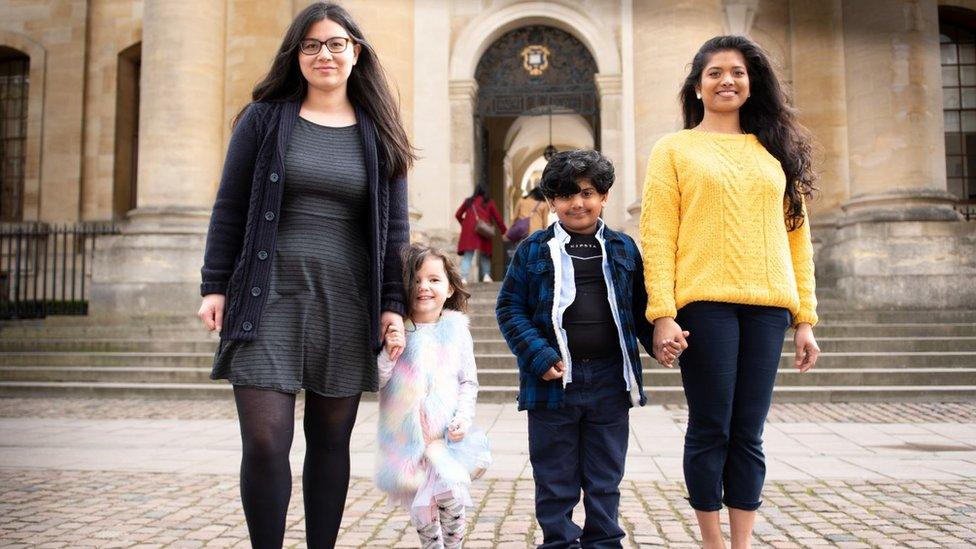
Emily and Aswathy both had children while studying at Oxford
Most undergraduates spend their first year at university learning how to stand on their own feet away from home, making new friends, and spending a fair few hours in the bar. But what happens if you get pregnant? Two women share their experience of being young mothers at Oxford.
Emily's story
Full name: Emily Beater
Degree: English literature and language, St Anne's College, Oxford
I never got freshers' flu - I had morning sickness instead. While other students were drinking too much and kissing strangers, I sat in my room, wondering what to do about the embryo inside me.
That morning, I'd been sitting with my friends in a freshers' week talk where they told us how privileged we were to be at Oxford. An hour later, I was holding a positive pregnancy test.
Shock still surges through me as I recall those two pink lines and my own, sharp inhalation. Pregnancy had been a question nudging the back of my mind. Now, it was a fact that I was spilling down the phone to my boyfriend, Jon, as he assured me we'd be all right.
I started to imagine the baby: small, bean-shaped, criss-crossed by blood vessels. I knew I didn't want an abortion, but Oxford's libraries, with their exquisitely wrought doors and enforced silences, hardly gave the impression of being accessible to children.
Later, a friend who had raised her baby during her master's degree at Oxford told me how when sitting outside a library with her daughter, a man had shouted: "You need to leave!" He'd assumed she was a tourist.
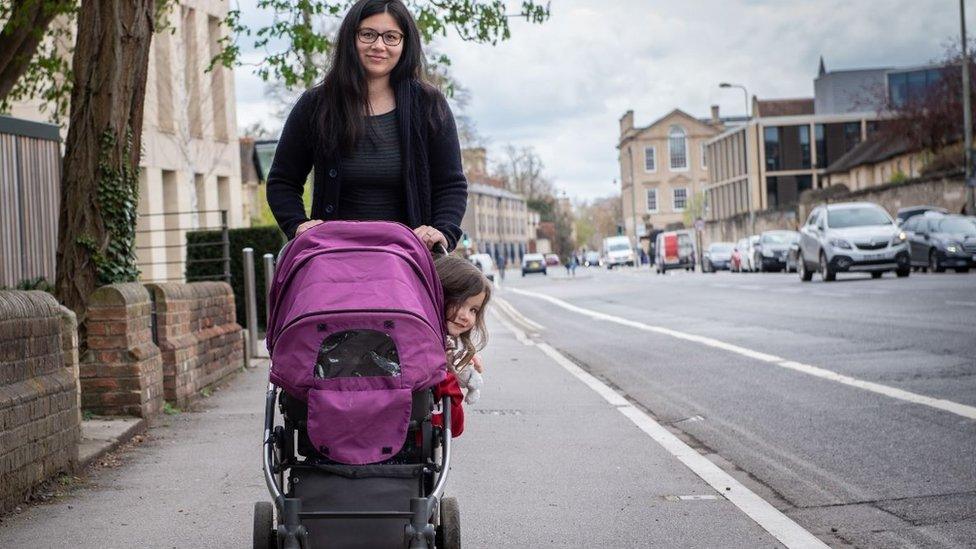
Emily and Beth outside St Anne's College
After discovering my pregnancy, I went to see my college tutor. She was incredibly supportive. Without her, I wouldn't have had the strength to have my baby and carry on with my degree.
Initially, the plan was for me to complete my first year while pregnant and then take a year's maternity leave. However, the struggle of balancing university with the early stages of pregnancy meant that I lasted about six weeks before I decided to take a year out and return after the baby was born.
Those six weeks were surreal. Oxford terms are so tightly packed that if I didn't rush to keep up, I'd be left behind.
The corridors of my student house would wind on and on, ending in chilly bathrooms where I'd retch every morning. I was hungry yet nauseous, unable to face our kitchen with its clutch of dirty pans.
I'd hold back the morning sickness in classes by swigging ginger ale and talking through a crush of Polo mints. I became very depressed. I was lucky to have kind fresher friends, but I was scared and my family were reeling from the news of my pregnancy.

Beth inside the library in Hartland House at St Anne's College
You feel like you can't be weak in those situations. People link unexpected pregnancy in young women so automatically with failure that, on top of enduring the pregnancy, I was constantly trying to prove to others that I wasn't going to fail.
Jon, who had been working since we met when I was 17 and he 19, would drive me home from Oxford, and I'd cry like a baby when I had to go back.
When I eventually suspended my studies for a year, my pregnancy felt like an exercise in explaining myself to others. What would I do? How would I cope? Would I ever go back to university? These are heavy questions to load someone up with at a vulnerable time, and I was barely forming the answers myself.
At the time, if you googled "undergraduate parents at Oxford", you were more likely to find information for the parents of 18-year-old freshers, than for students having babies.
I was lucky to have a supportive mum, but as a young parent I felt irredeemable.
After I'd given birth, Jon and I brought our newborn, Beth, to the GP. The doctor appraised us from her chair, and flatly announced that we were "silly" for having her so young. I remember telling her that I was going back to university, and her telling me, disbelievingly: "It's going to be very hard."
I returned the next academic year, with Jon and our 12-week old daughter, and Jon got a job nearby.
My college didn't offer family accommodation, so it was an anxious time organising where we would live on a meagre salary and student loan. Eventually, I discovered a small sentence on Oxford's graduate accommodation website, allowing undergraduates with children to live there.
We moved in, this couple barely out of our teens, living together for the first time and caring for a young baby.
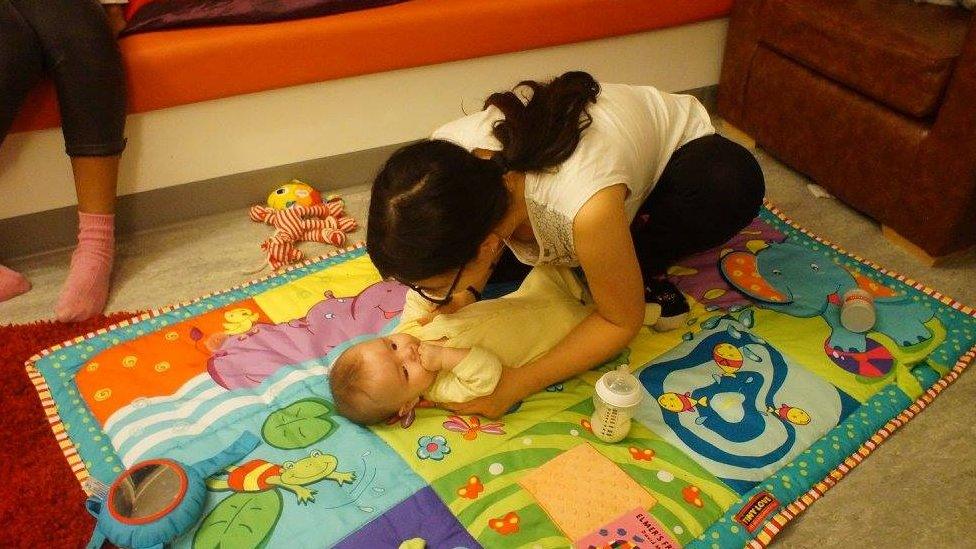
Emily plays with a baby Beth
I was eligible for a childcare grant from student finance, and because of Jon's job, we were able to put Beth in nursery. I felt guilty, but elated to get back to my studies, because, unlike motherhood, they were something I could control.
It was extraordinarily stressful. Parenting is the most all-consuming job. Thankfully, my tutor helped push for accommodations I needed, such as essay extensions when my daughter was ill.
It's a powerful thing when someone tells you that you can succeed, especially so when society equates getting pregnant "young" with failure.
We make childcare extortionate and higher education inaccessible - 60-65% of student parents have considered leaving their course, external - while telling young mothers that they've ruined their lives. And if you don't have childcare on the weekends, you can't work, so I had less time to study than my peers.
I was waking throughout the night to breastfeed, while preparing multiple essays and classes during the day.
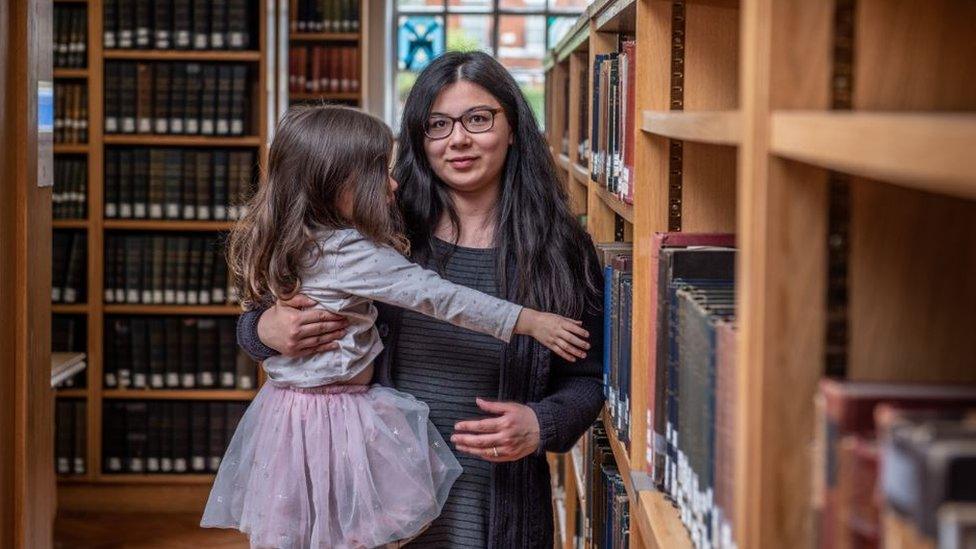
Emily says she has often experienced institutional blindness
I'm grateful for Jon's practical support, because I felt constantly on the edge of insanity.
I remember sitting in a cafe one Sunday in my second year, having cadged two hours to study while Jon took the baby alone. I stood up, packed up my stuff up, walked home and said: "I think I'm going to have a nervous breakdown."
I'm now in the final year of my degree. My tutors have been very supportive, but I've often been subject to institutional blindness.
Once, I was unable to get childcare for a weekend during my coursework, and was asked to submit "evidence" of this, as though it were an illness that could be proven with a doctor's note.
There was clearly nothing in place to anticipate a student with childcare needs. Caring for children, despite its intense, invisible labour, is still seen as a private thing which is irrelevant to academics.
A study found that 1 in 10 student parents feel isolated, which doesn't surprise me. The student parents I've met are so hardworking that they often put their health at risk to make sure their degrees happen.
My daughter is wonderful, and I'm so proud of all I've achieved, but I don't think it should be quite so hard to survive as a student parent.
Aswathy's story

Aswathy was in her second year when she found out she was pregnant
Full name: Aswathy Mohanaprakas
Degree: Portuguese and linguistics, St Peter's College, Oxford
It's 04:00 and I've fallen asleep on my laptop again. My son's crying jerks me awake. I ease him on to my breast and reopen my essay. I'm exhausted and the words don't make sense.
I'm an undergraduate parent at Oxford and I sleep for just three hours a night. My life of dropping my son off at nursery, racing to lectures, picking him up again and starting work when he falls asleep, feels like a marathon with no finish line.
At the moment, I can only afford two days of childcare a week, which gives me just enough time to go to classes and pick up books. I do most of my work in the middle of the night.
When I found out I was pregnant, I was 19 and in the second year of my degree in Portuguese and linguistics. I was very scared. I'd only known the baby's father, Jay, for three months. I was in love with him, but my parents disapproved and had already told me to break off the relationship.
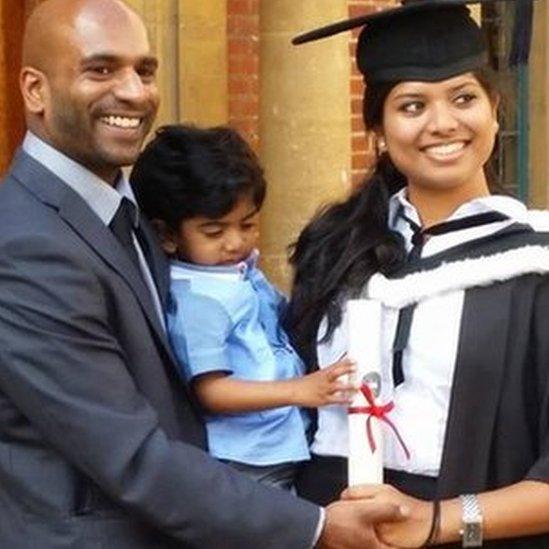
Aswathy's graduation day with Jay and Jithu

I'm from a small south Indian community in London, where gossip spreads fast and everyone knows each other. I never saw kids out of wedlock, unless they were being taken to India to get adopted.
Growing up, I was the girl everyone's parents compared them to. I went to prayer groups and I got the top A-level grades in my school. When I got accepted to Oxford, I was determined to succeed. This didn't change when I found out I was expecting my son.
I already felt like I'd achieved the impossible by getting into Oxford from a state school, and I decided to keep my baby and continue my degree. It was a tough decision though, and I was scared of what my parents would say.
In the end, I wrote them a letter:
I have to tell you something. It's important. I'm pregnant. About two and a half months along. Found out about a week ago. But didn't tell you cos I was panicking and didn't know what to do. I want to keep the baby. No matter how bad things get. And what people say about me.
I remember them visiting me in college after they read it, and my dad being so distressed he threw a cup against the wall.
As my belly grew, I would waddle around Oxford with my library books and travel home to get to know Jay more. He was really kind and would wrap me in blankets and make me smoothies, but it was hard developing a relationship while everyone was saying I'd brought shame on the family.
Jay asked me to marry him. We're very happy now, but at the time, I felt like getting married was the only way to control the gossip. Every time I walked in at the door, someone else seemed to know about the baby, and girls I used to be friends with were passing the news out like sweets: "Did you hear? She's pregnant!"
In my community, a girl can't even be seen with a boy without people sexualising the interaction, so if you get pregnant out of marriage, you are hugely shamed.
My parents kept saying: "You could have done so much with your life if you hadn't got pregnant."
Their aspirations for me to work for the United Nations or the government were replaced with odd jobs that I was doing during my maternity leave to survive.
My bridal shower erupted in a fight between my husband, mother-in-law and my mum. I just sat there and wished I was alone, reading a book. Once I gave birth, my parents fell in love with my son and increased their support for me, but other relationships deteriorated.
One person said I had no maternal instinct and mocked me by saying I didn't need a honeymoon because I'd already had sex. Once, Jay and I left Jithu in his car seat for a few seconds when we were unpacking shopping and a relative saw this and accused me of trying to harm my son.
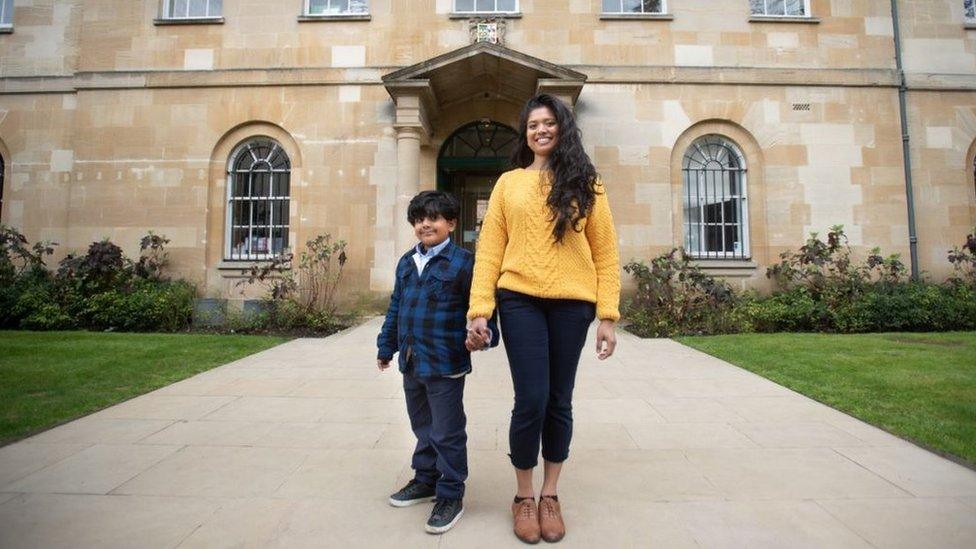
Aswathy got a job at Oxford University after graduating
I returned to Oxford when Jithu was nine months old - I was passionate about my degree and determined to complete it. I had classes on days that Jithu was in nursery, which left almost no time to do the actual work, while I would stumble back from the library with a huge bag of books and my son in a baby carrier.
Undergraduate degrees are often tailored for people with no caring responsibilities, so as a student with a young child, I felt invisible.

You might also be interested in:

Money was a constant worry. Student Finance wouldn't give me a childcare grant, because I'd returned to university partway through the year. An NUS report found that 42% of student parents say that financial difficulties are a barrier to study. I can relate to this.
We'd borrow money from my parents, give it back and then borrow it again the next day for food and nappies.
Oxford's hardship fund doesn't consider childcare needs to be an adequate reason for financial support. This puts poor, young parents like me at risk of losing out on our places.
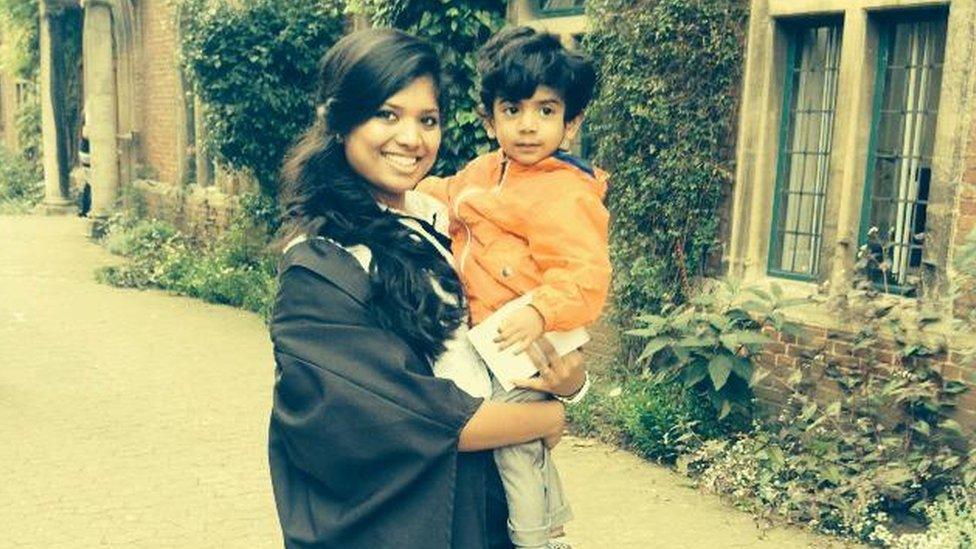
Aswathy graduated with a 2:1
Some of my tutors were helpful. Others weren't. One refused to mark my work because I didn't have time to research a subject he told me to, while another told me I'd get a 2:2, a 2:1 if the examiner was nice. I remember how awful I felt hearing that.
I came home sobbing about how I was a failure, even though I was doing everything in my power to succeed. I was just as talented as the other students, but I didn't have the same time or capacity as everybody else.
I graduated successfully - with a 2:1 - and I couldn't be prouder of myself, but it's been hard. I developed Graves' disease from the pressure of being a student mum. It's a thyroid disease which is triggered by chronic stress.
I didn't sleep for most nights during my degree, and every month I was worrying about how we'd find enough money for rent.
Jay commuted four hours a day to his job in London to make sure we had some income, but it was an unstable and exhausting existence.
It was particularly bad after I graduated, and no longer received a student loan. I had two part-time temp jobs, but I could barely piece together enough hours to cover childcare.
I needed more nursery hours to go to job interviews and do work experience - which I'd been unable to do during my degree - but I didn't know how I'd afford it.
I started feeling tired and out of breath all the time, and my bones were aching. When I was finally diagnosed with Graves' disease, I had monthly blood tests, and the medicines were £9 to £16. Sometimes, I just couldn't afford to buy them.
Eventually, I got a full-time job as a security governance risk and compliance officer at Oxford University. I work within the university, supporting cyber security issues and managing relationships with major data providers.
Things are better now, but I still look at time as though I'm a panic-stricken student-parent, thinking what work I can cram into 10 or 20 minutes. I feel sick every time I see a shade of blue that matches the walls of my mother-in-law's house, where I lived during my maternity leave.
Girls who got pregnant back home were shamed and had no support from their families. I want to change how people see teenage mothers. You can definitely succeed as a young parent.
Words by Emily Beater